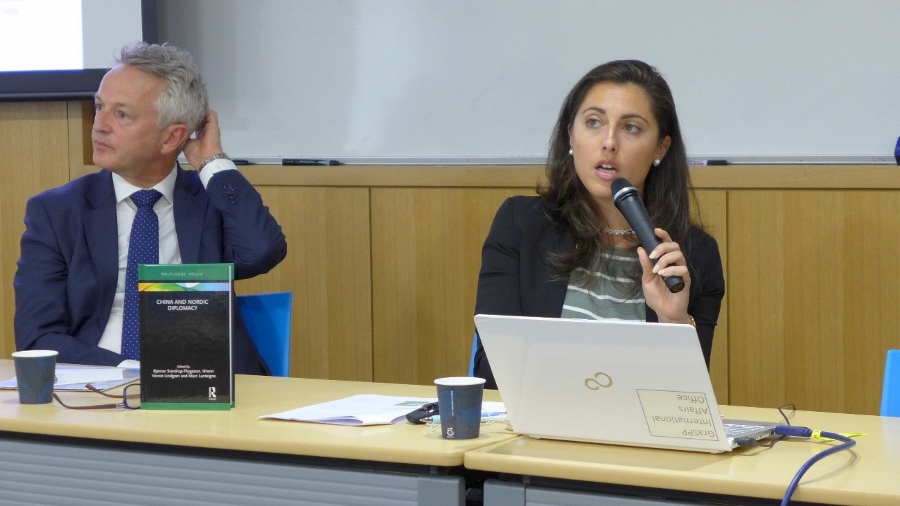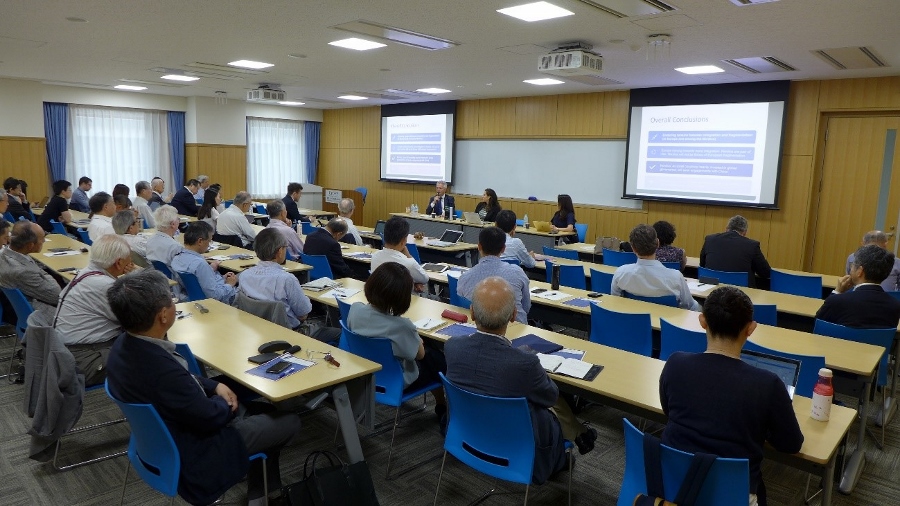SSU Forum/GraSPP Research Seminar” European Responses to China - Integration or Fragmentation?”
- Date:Tue, May 28, 2019
- Time:10:30-12:00
- Location:SMBC Academia Hall, 4F International Academic Research Building, the University of Tokyo.
MAP - Title:
“European responses to China – integration or fragmentation?”
- Speaker:
- Ulf Sverdrup, Professor and Director of the Norwegian Institute of International Affairs (NUPI)
- Wrenn Yennie Lindgren, Research fellow at Norwegian Institute of International Affairs (NUPI)
- Language:
English
- Hosts:
Security Studies Unit, Institute for Future Initiatives, the University of Tokyo
GraSPP Research Seminar, the University of TokyoThe Institute for Future Initiatives and GraSPP Research Seminar collects personal information in order to provide you with information about our current and future activities. Your personal information will not be disclosed to any third party.
While the increasingly tense relationship between the US and China captures most of the attention in international affairs today, there are also considerable dynamics in the relationship between Europe and various Asian partners. Recently, Japan has further intensified its relationship with the EU, establishing both an Economic Partnership Agreement and a Strategic Partnership Agreement, and Prime Minister Abe visited the EU in April.
A key issue for Europe is how Europeans can best deal with China. Is it through the development of a more united and integrated policy, or is it through more fragmented policies shaped by the different interests of the various member states? A better understanding of this issue will help us shed light on the nature of the EU as a global actor and the future of multilateralism.
In this talk, Ulf Sverdrup and Wrenn Yennie Lindgren will discuss some of the recent developments in Europe’s approach to China, including attempts to create more unified policies, as expressed by the 2019 EU-China Strategic Outlook. In their presentation they will also shed light on issues related to Sino-Nordic relations.
The Security Studies Unit (SSU) of the Institute for Future Initiatives (IFI) was delighted to host a talk delivered by Professor Ulf Sverdrup, Director of the Norwegian Institute of International Affairs (NUPI), and Ms. Wrenn Yennie Lindgren, Research Fellow at NUPI. The event was co-hosted by the Graduate School of Public Policy (GraSPP).

Chiyuki Aoi, Professor of International Security at GraSPP and member of SSU, chaired the session. She introduced the speakers to the audience, recalling the important role that European countries and the European Union as an institution play in East Asia.
Professor Sverdrup opened his speech by thanking the hosts, the chair, and SSU Director Professor Kiichi Fujiwara. He then explained the various components of the session’s title, particularly “integration” and “fragmentation”. Does the European approach to Beijing present a somehow more unified front? A few years ago at a different event at UTokyo the question was whether or not the EU could have overcome its existential crisis. Today, the EU is still here. Focusing on the EU and China, it seems clear that Europe is going to be affected by the present and future developments taking place in US-China relations, which we see at play in current events, not only the trade war, but in the general re-assessment by the US of its strategic engagement with China. Europe as well is moving towards a change in that respect.
China is definitely becoming more important for Europe, first because its share of global GDP is constantly growing, but also because of Chinese investments in Europe, which now surpass those in the US. The Chinese are also investing more in Europe than Europeans do in China. The EU’s approach to China is one which tries to preserve the benefits of an open society, without compromising security: avoiding protectionism while keeping unwanted security risks at bay, and avoiding any weakening of the EU architecture. If one asks the question: is Europe becoming more consistent, interdependent, more structurally connected in its dealings with China, the answer appears to be: yes. Professor Sverdrup remarked that of course, despite this increased integration, Europe’s interaction with China reflects the many economic, political and cultural differences within Europe, and it is therefore a complex process. While the EU has been rather myopic in dealing with Beijing in the past, now some kind of strategic vision is emerging, as also reflected in the white paper entitled EU-China: A Strategic Outlook, recently published by the European Commission. The paper has attracted numerous comments and criticisms, but it provides the picture of a shift in the European response to China. EU-China relations occur at many levels, and at each of them Beijing can be seen in a different light: sometimes as a partner, for instance in certain forms of international cooperation, sometimes as an economic competitor, or as a systemic rival. The EU does not label China as a “strategic competitor”, as in the US national strategy parlance. The EU Commission thinks that a better engagement with Beijing should emerge from a deepening of bilateral relations, which should become more balanced and attain the condition of full reciprocity. Europe should also strengthen its domestic policies in a number of key areas in order to maintain its industrial base, values, and social model. The instrument of choice for this kind of policy is the power of the single market, and access to it in terms of norm compliance.

Ms. Yennie Lindgren took over from that point and illustrated the relations between China and the five Nordic countries, namely Norway, Denmark, Iceland, Sweden, and Finland. Despite their significant diversity, Nordic countries share a number of historical and cultural features, and have come to see themselves as a community. How does this community relate to Beijing? Ms. Yennie Lindgren answered this question by pointing to the edited volume China and Nordic Diplomacy (2017), where several aspects of the matter are analysed. China is interested in the Nordic countries, most importantly in their expertise and know-how related to green technologies, and the Arctic. Indeed the Arctic has become an area where China’s activities have increased, and are likely to increase even more in the future, also as a consequence of climate change. Since 2013 Beijing is an observer in the Arctic Council. The Nordic countries on the other hand are interested in keeping Beijing’s behaviour with the rule of international law. More generally, the Nordic countries are heavily invested in global governance, and will try to preserve the current structure of the liberal international order as much as possible, also operating within the broader European context and through the European Union.

※This forum was organized in connection with the MOFA subsidy projects granted to SSU of IFI.